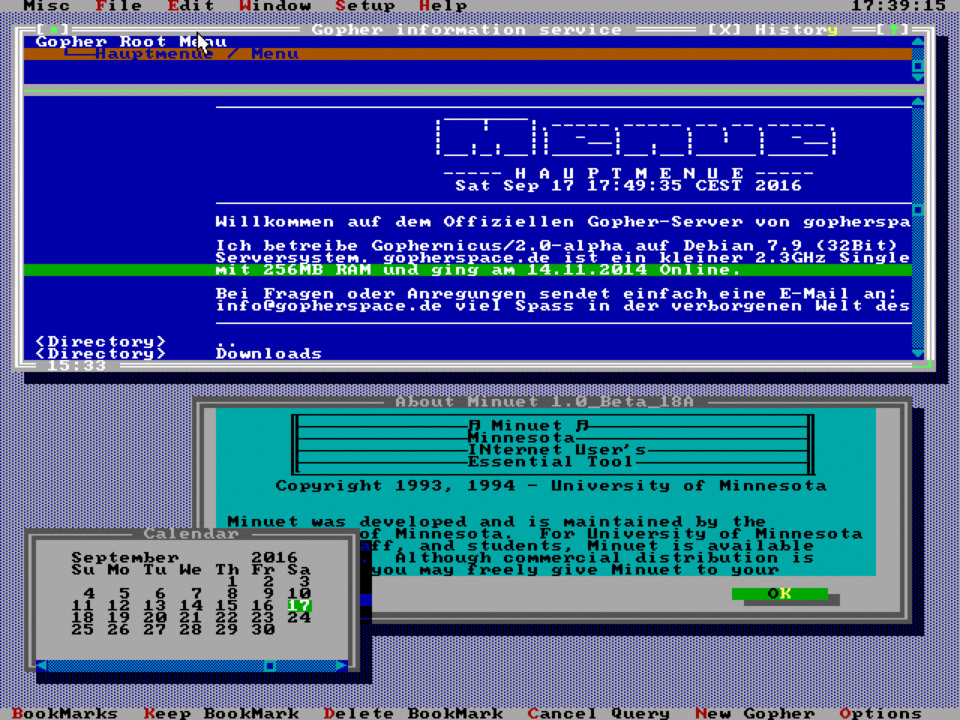Make Internet Great Again
I think we’re at a turning point in the history of our civilisation. We’ve all thought stability was the way to go, but it feels like things are changing more quickly than ever before, at least in our lifetime. It’s a shame, but it looks like the internet, one of the best inventions of the 20th century, is playing its part in this change. Why is that?
 Because the mail never stops (Seinfeld)
Because the mail never stops (Seinfeld)
I discovered the internet around 1995 when I had the opportunity to use it at the Wrocław University of Science and Technology. They had plenty of MS-DOS and Windows 3.11 computers with monochrome CRT monitors connected to a local network and the internet. I used tools such as Telnet (to access the local Unix server), FTP, Minuet, and Gopher. I got my first email address and used the Unix mail command to access it. Once I had managed to type the win.exe command and start Windows, I had access to Netscape Navigator and could browse the web. At the time, it was a brilliant idea to have a paper notepad (or a text file on a 3.5” floppy disk) to write down all the URLs that I wanted to visit later. Google.com didn’t exist yet, and the early search engines, such as AltaVista and Yahoo!, weren’t very good at indexing and searching. It wasn’t uncommon to have a special Links subpage on a home page gathering a recommended links with a very varied content.
 Minuet screen / Wikipedia
Minuet screen / Wikipedia
Most of the content was either files or code snippets available on some FTP servers, or the very first “home pages” created by random people with more or less interesting content. One valuable thing I discovered was that anyone could publish whatever they wanted and make it instantly accessible to others (as long as you knew how to find it). This was a complete democratisation of information at the time. At the same time, there was Usenet, an open forum for people to discuss things. Another brick in the wall of democracy. Of course, that was where spam and trolling were born, but nobody could have predicted where it would lead.
Nevertheless, content creation was still restricted to technical people, as you usually needed to know at least HTML and a bit of CSS to create a webpage. Buying domains and setting up hosting wasn’t trivial for most people either. Usenet groups were just groups, and messages could easily get lost in the flood of new posts. In the second half of the 2000s, Web 2.0 was born. Social media platforms emerged, blogging services were created, and video services such as YouTube enabled people to produce video content without any technical knowledge. At this point, I made one of the worst judgements of my life, saying that the mainstream media’s monopoly was over and that we could finally have a real democracy on the internet. I was so wrong.
At first, there were loads of different social media sites, but now there are just a few big names left (does anyone remember MySpace, Google Plus or Nasza Klasa?). Blogs were killed off by the monetisation model of streaming platforms. If you’re familiar with IT, you’ll remember that you could once find technical blog entries with solutions. Now, you have to watch a 10-minute YouTube video just to realise that it’s covering a trivial case or scratching the surface. Big Tech companies that own social media started tweaking their algorithms to maximise their profits, so they’re not interested in showing you content that you want to see. Instead, they want to keep you on the platform for as long as possible. You can safely assume that any undesirable post you see is clickbait.
I remember having a chat with a colleague once where I was just like, what’s the point of the iPad? He said I didn’t get it because the device’s main purpose is to consume content. I was pretty shocked by this answer, as it seemed like ‘newspeak’ (see 1) and, generally, just marketing fluff. But I was wrong and he was right. The internet, which was originally just a way to share info, has turned into a place where people waste a lot of time. These days, content isn’t just a book or article, it could be a short video or even a meme. The algorithm suggests more of the same based on what you watch, and it gathers data about you to try and predict your preferences. This data is a real goldmine and can be the foundation of a business model. Do you remember when we were so excited that there were so many free services available? Now we all get it.
So, here’s the current state of the internet: We’ve got social media platforms that we can use for free. But to get anywhere, you need reach. You can use any content you like, but to be effective, you need to follow some not-so-obvious rules. Not all content is promoted by algorithms. If you want more views, you need to make your content as clickable and sensational as possible. The more polarised your audience, the better. If you can make people angry, they’ll share your content and you’ll get more views. This is just how the internet works these days. Lots of content is now created by bots. Generative AI has made it even easier to generate content. This is how the World Wide Web becomes garbage.
That’s why I’ve decided to go back to old-school blogging. Just to let you know, I’m not getting any comments on my blog. It’s a statically generated website, so it doesn’t need any blogging platform. Will I be successful? I’m not sure, but I’ll have a good time trying. I just want to get the info across.